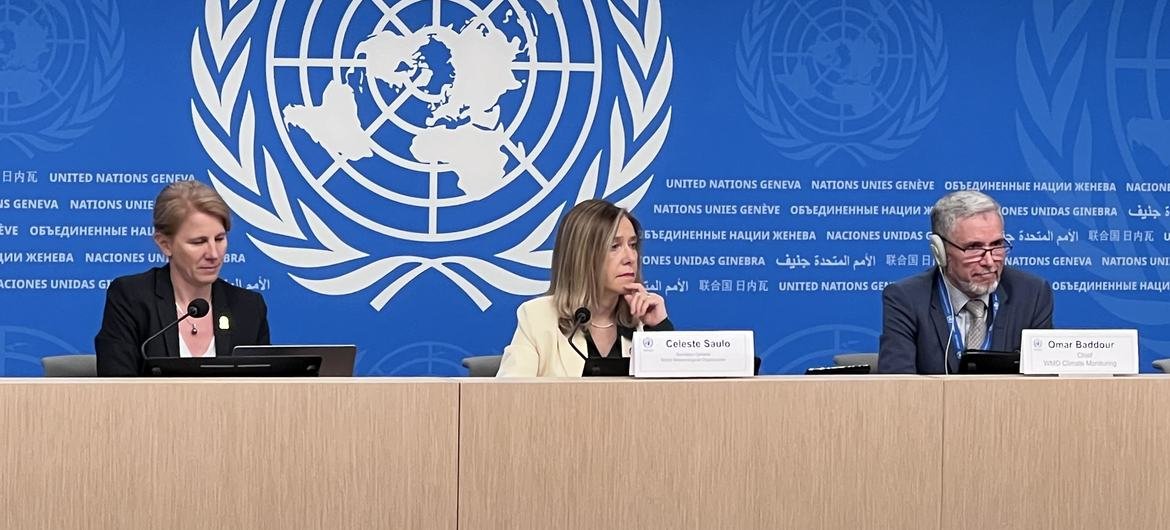WMO Secretary-General Celeste Saulo sounded a Red Alert to the world, emphasizing the urgency of the situation.
In a stark announcement, the World Meteorological Organization (WMO) has revealed that numerous records have been shattered across key climate indicators, as outlined in the WMO State of the Global Climate 2023 report. From greenhouse gas levels to ocean heat and acidification, the report paints a grim picture of a planet in distress, with dire consequences for ecosystems and human societies.
The climate report confirms that 2023 stands as the warmest year on record, with the global average near-surface temperature reaching 1.45 degrees Celsius above the pre-industrial baseline. This marks the continuation of a disturbing trend, with the past decade being the warmest ten-year period ever recorded.
United Nations Secretary-General António Guterres underscored the severity of the situation, stating, “Sirens are blaring across all major indicators… Some records aren’t just chart-topping, they’re chart-busting. And changes are speeding up.”
Of particular concern is the proximity to the 1.5 degrees Celsius lower limit set by the Paris Agreement on climate change. WMO Secretary-General Celeste Saulo sounded a Red Alert to the world, emphasizing the urgency of the situation. She highlighted that the impacts of climate change extend far beyond rising temperatures, with unprecedented ocean warmth, glacier retreat, and Antarctic sea ice loss raising significant alarms.
Throughout 2023, the planet experienced a barrage of extreme weather events, including heatwaves, floods, droughts, wildfires, and intensifying tropical cyclones. These disasters wreaked havoc on communities worldwide, disrupting daily life for millions and inflicting substantial economic losses amounting to billions of dollars.
Marine heatwaves, in particular, emerged as a concerning phenomenon, affecting nearly one-third of the global ocean on an average day. This widespread ocean warming had detrimental effects on crucial ecosystems and food systems. Moreover, the report highlighted that over 90% of the ocean experienced heatwave conditions at some point during the year, underscoring the severity and extent of the issue.
The loss of ice across reference glaciers reached unprecedented levels, driven by extreme melt in regions like western North America and Europe. Additionally, Antarctic sea ice extent hit a record low, with the maximum extent at the end of winter shrinking by 1 million km2 compared to previous years.
The climate crisis intertwines with broader global challenges, including inequality, food insecurity, population displacement, and biodiversity loss. The number of people experiencing acute food insecurity more than doubled in 2023, exacerbated by weather and climate extremes that aggravate existing vulnerabilities.
Despite the grim outlook, there is a glimmer of hope in the form of renewable energy. The rapid expansion of renewable energy capacity, driven by solar, wind, and hydroelectric sources, presents a promising pathway towards decarbonization. In 2023, renewable capacity additions surged by almost 50%, reaching a total of 510 gigawatts, the highest rate observed in two decades.
In response to these alarming trends, global climate leaders and ministers will convene at the Copenhagen Climate Ministerial on March 21-22. The meeting aims to accelerate climate action and enhance Nationally Determined Contributions (NDCs) ahead of the February 2025 deadline. Financing for climate initiatives will also be a key agenda item at COP29, with a focus on translating national plans into tangible actions.
Addressing the need for enhanced climate services, WMO Secretary-General Celeste Saulo emphasized the importance of supporting National Meteorological and Hydrological Services, particularly in developing countries, to inform effective mitigation and adaptation strategies.
The release of the State of the Global Climate report coincides with World Meteorological Day on March 23 and sets the stage for a new climate action campaign by the UN Development Programme and WMO, launching on March 21. As the world grapples with the escalating climate crisis, collaboration and decisive action remain imperative to safeguarding the planet and its inhabitants.
